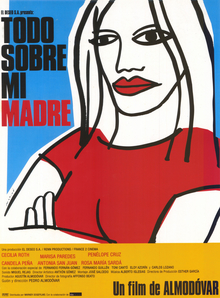 Image via Wikipedia
Image via WikipediaSo if you have been reading along this week, so far I have told you about my siblings who choose not to talk to me and our mother who promoted discord and unstable relationships among the four of us growing up. I've talked about how, on my mother's side of the family, there is a multi-generational history of emotional cutoff. Then I admitted that, without the cooperation of my siblings, I am unable to stop this cycle from continuing.
So today I'm going to talk about how I grew up and learned to have a mature relationship with my mother BEFORE she died. That's right, I figured out a way to interact with her that didn't leave me depleted, angry or feeling like she had taken advantage of me. I actually was able to successfully interact with her AND feel good about it.
How did I do this?
It started in 1995 when I took a vacation from my family for a year and a half. I flat out told my mother that I needed to figure some things out for myself and didn't want to talk to her for a while. I didn't change my number or my address so my parents knew how to get a hold of me, but I also didn't encourage my mother to contact me "if there was an emergency" because she clearly didn't understand what the word emergency meant.
I spent that time getting to know myself and who I was. I looked at the mythology my family created about who I was and decided I wasn't buying into it any more. For example, my mother frequently said I was selfish and self-centered and, after careful consideration, I decided that wasn't an accurate description of myself. I went through every aspect of the mythical Selena, compared them to the real Selena and came to the conclusion that my family just didn't understand me.
Rather than be angry or upset, I decided to just try to accept this as fact. After all, up to that point, I had spent 30 years trying to demonstrate that they had it all wrong, trying to get them to see the real me. I gave up on seeking my family's validation and approval. I embraced the fact that I was an adult and could do whatever I wanted to do and it didn't matter what my family thought or how they judged me.
I also recognized that many of my family's judgments, criticisms and rejections were steeped in emotionality. So I decided that I was going to try and avoid getting caught up in the emotional tornado of bitterness, unhappiness, shame, hysteria and anxiety that swirled around my family. I worked on adopting a calm, cool and collected stance so my thinking and behavior could be rooted in a careful consideration of the facts.
Then came the big test.
December 1996 I got a Christmas card from one of my sisters saying "Dad really needs us now." So I went to go visit him when my mother was at work and immediately could tell he displayed cognitive deficits indicative of Alzheimer's disease. I decided my vacation was over and I needed to be involved with my parents once again. But instead of allowing myself to get sucked back into old patterns of behavior, I started setting limits with my mother.
In the past, my mother sought me out when she wanted me to do something for her. So I started by reminding myself that this was HER husband and it was HER responsibility to care for him, even though this was my dad and my heart yearned to take care of him myself. This time, I gave her the information and referrals she needed so she could take care of HER husband HERSELF. I would support her and my dad, but I wasn't solving this situation for her.
I worked on not letting her hurt my feelings when she said something objectionable. I worked on being open-minded when she spoke, listening instead of formulating a comeback to her opinions. I worked on controlling my temper. I worked on being clear about my limits and what I was and wasn't willing to do. I worked on being compassionate, not critical of my mother. I worked on accepting that I couldn't change her thoughts, feelings or actions, only my own.
It's amazing how other people respond when you change.
It wasn't all that I wanted or hoped for, but we somehow were able to get along better. I made choices about what I was going to do and didn't succumb to pressure to do more. I acted thoughtfully, in the best interest of myself, my husband and my parents (in that order.) I sidestepped the emotional tornado and didn't get caught up in the panic, fear, hostility or guilt. I could disagree with her and it just wasn't a big deal anymore. I focused on just being ME, without worrying about having to justify or defend myself.
When my mother was diagnosed with colon cancer a month before my wedding in 1998, I didn't postpone our plans. I did everything I could to be there for her during her illness and took care of my dad when she was gone. We never truly resolved our differences before she died, but I did go and say goodbye to her. I don't have any regrets. I am confident I did everything a good daughter would have done to help their dying mother, which in turn gives me peace of mind as I move forward with my life.
![Reblog this post [with Zemanta]](http://img.zemanta.com/reblog_b.png?x-id=04bdaf44-9a75-474a-a188-a2c17969bab6)



Reply to this post
Post a Comment